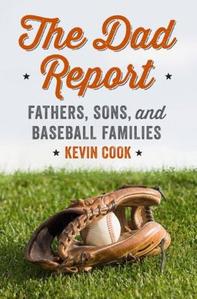
|
|
| photo: Pamela Marin | |
Son of celebrated screwball pitcher Art Cook, Kevin Cook is former senior editor at Sports Illustrated and has written several books, including Titanic Thompson: The Man Who Bet on Everything, Tommy's Honor: The Story of Old Tom Morris and Young Tom Morris, Golf's Founding Father and Son and Kitty Genovese: The Murder, the Bystanders, the Crime that Changed America.
The Dad Report: Fathers, Sons and Baseball Families (W.W. Norton) takes a look at the generational effect in baseball, focusing on the fathers, sons and sometimes grandsons who play the game in the minor and major leagues. The title comes from the Cook men's phone conversations as Kevin traveled the country writing for Sports Illustrated, calling home to tell his dad he loved him the best way they knew how: with stories of baseball.
You've been writing about sports for a long time.
Pretty close to forever. Part of it goes back to my own youth. I wound up not being the ball player that my dad was. It makes you kind of value the game, I think, over the years of covering ballplayers and seeing all the connections that you run through, especially baseball, with its long and well-documented history.
One thing I found with ballplayers is so often they like to talk about their dads. That's the guy who taught them the game. Those are the fondest memories they have before the game became a business. That's really where the book came from: just finding out how many ballplayers like to talk about their own dads.
You have several chapters about your own father, Art Cook.
Yes. He was a very good ballplayer. He pitched and got as high as Double-A ball before he hurt his arm. He entered some footnotes to baseball history. He gave up a home run to Reds' slugger Ted Kluszewski, that Dad always told me is still in the air to this day. He had funny stories, like he had one finger that he could bend all the way back because it had been just ruined by a line drive many years before. It didn't occur to me until years later to ask what had happened on that play. He remembered that he had grabbed the ball and thrown the guy out before he left the game.
That's a really specific memory. How many plays did he actually participate in? How does he remember the details so well?
Thousands and thousands. That's the funny thing that you run into with ballplayers, both pitchers and hitters. There are hitters who remember every at-bat of their whole careers. There are some very good hitters who take notes--"I want to remember this pitcher and how he pitches me."
There are guys like Bret Boone, who I spoke to--he was of the three-generation Boone family. His dad, Bob, was a fine catcher for the Phillies, and Grandpa Ray was a fine player and a scout. Bret Boone remembers all of his at-bats, and he could still tell you who owned him and who he managed to hit pretty hard. I think they are vivid memories for so many of us if we're lucky enough to spend a little time on the field.

They were all for this book. One of them came from my experiences working from magazines, like chasing Barry Bonds around for a story. I spent some time with Michael Jordan for a piece, but the stuff in the book is not in the magazine story. The funny thing is when we got done talking with Jordan for a basketball story, we found out what he really liked talking about was baseball. His brief career with the Birmingham Barons is often remembered as a flop and a failure when, in fact, here's a guy who hadn't played ball since high school, had never faced a professional pitch, who went straight to Double-A and batted .202 for his season. It wasn't a failure, and that's also, as it turns out, his way to really honor the memory of his father, who liked baseball better than basketball.
Right. The Michael Jordan of baseball isn't remembered as a good ball player.
That's how it's remembered, and it really kind of enters popular memory that he was so bad. In fact, I'd like to see sports writers of my generation go out there and face some Double-A pitching and hit .202. It wouldn't happen.
You are able to humanize these players, including guys like [steroid user] Barry Bonds. What's your take on that?
I think one thing that's really not understood about Barry Bonds is that he can be a very moody character. He blew me off a few times, and then we had a great time playing golf. I think it's almost tragic that the guy was one of the two or three or four best hitters of all time, and he won't be remembered that way. Out of jealousy of an inferior hitter like Mark McGwire, Barry went to the dark side. It's a shame, because as he talked to me, the one thing that meant a lot to him was the Hall of Fame; if he got something of his in the Hall of Fame, it would honor his family, and his father, Bobby Bonds.
I am one of those guys who didn't have a great deal to talk about with his father for years. We wouldn't talk about religion or the weather or politics, but we found that we could always talk baseball. Even living far apart, we'd have these long phone calls just about what was going on in baseball.
I wound up doing the same thing with my son, with whom I don't talk politics or religion or things like that. We talk baseball, and we still call it the Dad Report. One project that was a part of this book was to go back to where my dad pitched, and his grandfather, and finding a ball field--the diamond itself is still there--and throw the ball around to call up the echoes of Art Cook's playing days.
What's the appeal of baseball? Why is it so enduring?
It rewards scrutiny. The more attention you pay to it, the more interesting it gets. I'm often asked, "What's your favorite team?" I've never had a favorite team. I always just want to see a good ball game. It's the guys who you choose to admire, who to me are gamers. They're maybe not the most talented guys, but they're the guys who fight the hardest to play well and keep the tradition going.
Yeah, it's a frightfully competitive and grueling game. 162 games just wears you down. I think it takes a great deal of character to summon the strength, focus and attention that the baseball season demands. They wound up being the guys that I admire. I admire Ike Davis for keeping his chin up. Sometimes he'll hit two 450-feet homers in a game, and then go homer-less for two months. That's a hard thing to get used to. You call your dad and he says, "Hey, I got bought twice, traded four times, and released."
I watch Yankee games with my daughter. I never imagined having Yankees fans for kids, but we moved to New York, and that's what they became. The one thing that means a great deal to me is just talking about it. There's nothing better than watching a game and talking about who gave a lot of extra effort on that play, even if he didn't make the play.
It's the underdog story that keeps it fresh for you.
I think it is. The one thing I really came to believe, to paraphrase an old baseball saying, is that it's not whether your team wins or loses that counts, it's how you share the game. In some ways, the game is almost a pretext. It may be a lousy game today, but the fact that you're there together with people you love to talk baseball with, that's what really counts to me. --Rob LeFebvre, freelance writer and editor

